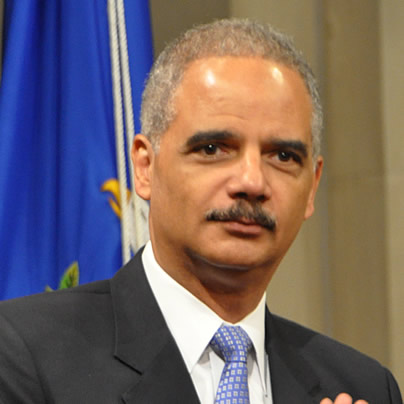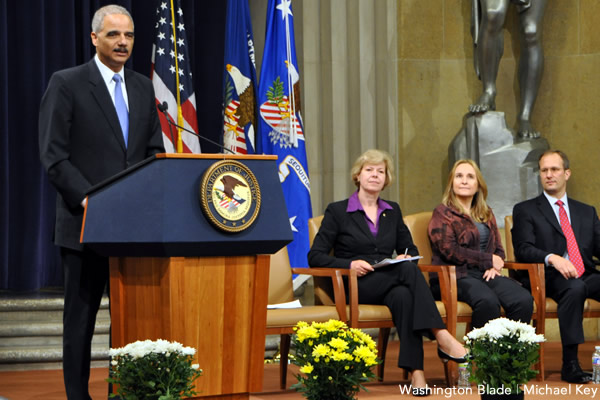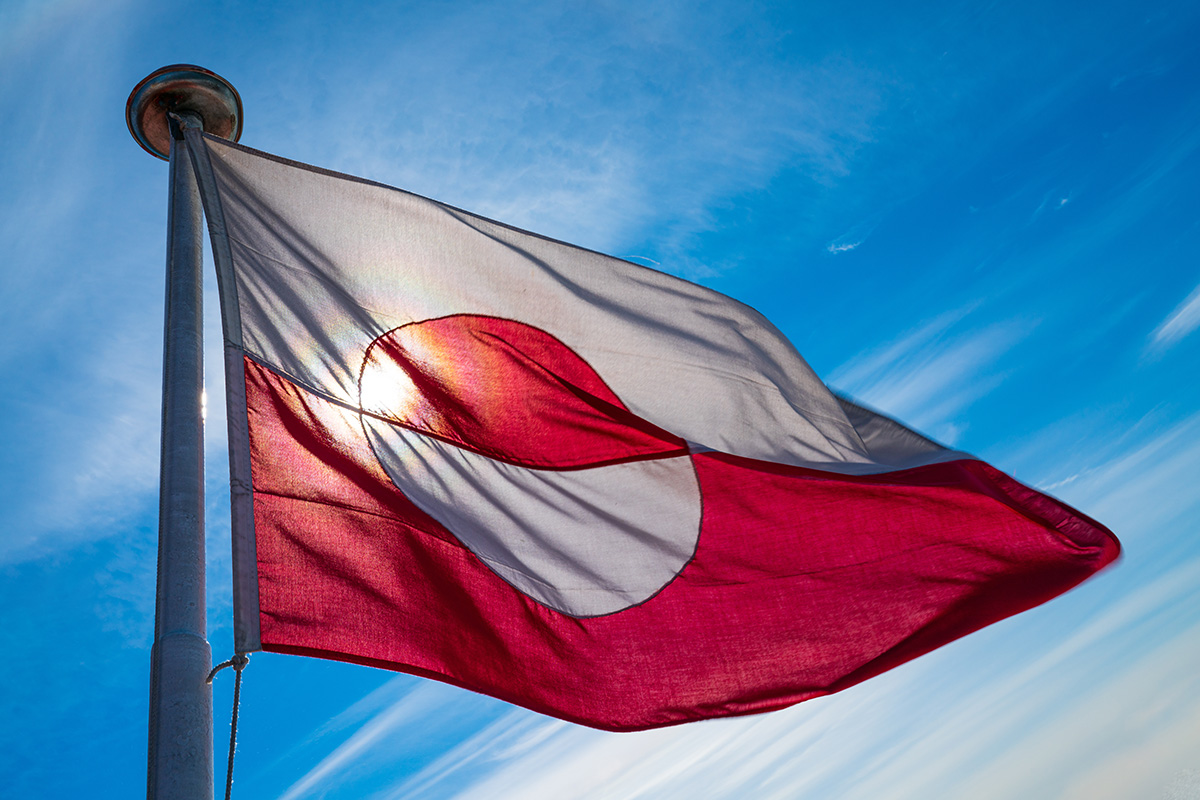News
Holder to announce new DOJ policy on gay rights
Attorney general to unveil changes during speech at HRC gala in NYC


U.S. Attorney General is set to announce new DOJ policy in the wake of the Supreme Court decision against DOMA (Washington Blade photo by Michael Key).
U.S. Attorney General Eric Holder is set to announce a new policy today aimed at ensuring the Justice Department recognizes same-sex marriages under the law, the Washington Blade has learned.
Holder is scheduled to deliver the remarks at 7 p.m. during his speech at the Human Rights Campaign’s annual gala in New York City held at the Waldorf Astoria.
According to excerpts from his prepared remarks, Holder is set to announce the Justice Department will issue a memorandum on Monday to outline the changes, which will bring the department into compliance with the Supreme Court’s decision against the Defense of Marriage Act.
Holder is prepared to make the announcement in the same speech in which he’s set to reflect on the 50th anniversary of Martin Luther King, Jr.’s “I Have a Dream” speech and passage of the Civil Rights Act of 1964.
“And yet, as all-important as the fight against racial discrimination was then, and remains today, know this: my commitment to confronting discrimination based on sexual orientation or gender identity runs just as deep,” Holder’s prepared remarks say. “Just like during the civil rights movement of the 1960s, the stakes involved in this generation’s struggle for LGBT equality could not be higher.”
Each of the changes is related to the way the Justice Department handles recognition of married same-sex couples. They range from rights in civil and criminal cases, rights as inmates and access to benefits programs:
• The Justice Department will recognize that same-sex spouses of individuals involved in civil and criminal cases have the same legal rights as straight married couples, including the right to decline to give testimony that might incriminate a spouse.
This new rule applies in non-marriage equality states. The government won’t object to couples in same-sex marriages invoking this right if they marry in another state, but their current jurisdiction doesn’t recognize their union.
• In bankruptcy cases, the U.S. Trustee Program will take the position that same-sex married couples should be treated in the same manner as opposite-sex married couples. Consequently, same-sex married couples will be eligible to file for bankruptcy jointly; certain debts to same-sex spouses or former spouses will be excepted from discharge; and domestic support obligations should include debts, including alimony, owed to a former same-sex spouse.
• Federal inmates in same-sex marriages will be entitled to the same rights and privileges as inmates in opposite-sex marriages. These rights include spousal visitation; inmate furloughs to be present during a crisis involving a spouse; escorted trips to attend a spouse’s funeral; correspondence with a spouse; and compassionate release or reduction in sentence if an inmate’s spouse is incapacitated.
• The Justice Department will recognize same-sex couples for the purposes of a number of benefits programs it administers, such as the Radiation Exposure Compensation Program and the September 11th Victim Compensation Fund.
Also among these programs is the Public Safety Officers’ Benefits Program, which provides death benefits to surviving spouses of public safety officers, such as law enforcement officers and firefighters, who suffer catastrophic or fatal injuries while on duty.
“When any law enforcement officer falls in the line of duty or is gravely injured, the federal government should stand by that hero’s spouse – no matter whether that spouse is straight or gay,” Holder’s prepared remarks say.
The new policy comes seven months after the U.S. Supreme Court decision against Section 3 of the Defense of Marriage Act, which prohibited federal recognition of same-sex marriage. Nothing in the excerpts of prepared remarks received by the Blade references DOMA, but a Justice Department official said the new changes are considered a step in the process to bring the Justice Department into compliance with the decision.
The Justice Department has coordinated the effort across the Obama administration to ensure married same-sex couples have the same rights and benefits under federal law as opposite sex couples in the wake of the DOMA decision. The various departments and agencies announced changes in policies since that time.
Chad Griffin, HRC president, praised Holder in a statement for changes he’s slated to announce within the Justice Department.
“This landmark announcement will change the lives of countless committed gay and lesbian couples for the better,” Griffin said. “While the immediate effect of these policy decisions is that all married gay couples will be treated equally under the law, the long-term effects are more profound. Today, our nation moves closer toward its ideals of equality and fairness for all.”
At least one of the changes that Holder is set to announce — the eligibility of married same-sex couples to file jointly for bankruptcy — was already the policy of the Justice Department. According to Reuters, following a ruling against DOMA by a bankruptcy court in Los Angeles, the Justice Department in 2011 elected to no longer dismiss bankruptcy petitions filed jointly by married same-sex debtors.
In his remarks, Holder is set invoke the memory of former U.S. Attorney General Robert Kennedy and his work in the civil rights movement as a reference point for the additional work the Justice Department is doing on LGBT rights.
“Then, as now, nothing less than our country’s commitment to the notion of equal protection under the law was on the line,” Holder’s prepared remarks say. “And so the Justice Department’s role in confronting discrimination must be as aggressive today as it was in Robert Kennedy’s time. As Attorney General, I will not let this Department be simply a bystander during this important moment in history.”
Just last month, Holder announced the federal government would recognize the more than 1,300 same-sex marriages that took place in Utah following a district court ruling legalizing gay nuptials in the state — even though the state won’t recognize the unions now that the U.S. Supreme Court has placed a stay on the weddings.
HRC’s Griffin said the actions that Holder is preparing to undertake are right in line with Kennedy’s legacy as civil rights icon.
“Attorney General Holder continues to show incredible leadership, and this latest action cements his place in history alongside Robert F. Kennedy, another attorney general who crusaded for civil rights,” Griffin said.
The White House
Trump-Vance administration ‘has dismantled’ US foreign policy infrastructure
Current White House took office on Jan. 20, 2025

Jessica Stern, the former special U.S. envoy for the promotion of LGBTQ and intersex rights, on the eve of the first anniversary of the Trump-Vance administration said its foreign policy has “hurt people” around the world.
“The changes that they are making will take a long time to overturn and recover from,” she said on Jan. 14 during a virtual press conference the Alliance for Diplomacy and Justice, a group she co-founded, co-organized.
Amnesty International USA National Director of Government Relations and Advocacy Amanda Klasing, Human Rights Watch Deputy Washington Director Nicole Widdersheim, Human Rights First President Uzra Zeya, PEN America’s Jonathan Friedman, and Center for Reproductive Rights Senior Federal Policy Council Liz McCaman Taylor also participated in the press conference.
The Trump-Vance administration took office on Jan. 20, 2025.
The White House proceeded to dismantle the U.S. Agency for International Development, which funded LGBTQ and intersex rights organizations around the world.

Secretary of State Marco Rubio last March announced the State Department would administer the 17 percent of USAID contracts that had not been cancelled. Rubio issued a waiver that allowed PEPFAR and other “life-saving humanitarian assistance” programs to continue to operate during the U.S. foreign aid freeze the White House announced shortly after it took office.
The global LGBTQ and intersex rights movement has lost more than an estimated $50 million in funding because of the cuts. The Washington Blade has previously reported PEPFAR-funded programs in Kenya and other African countries have been forced to suspend services and even shut down.
Stern noted the State Department “has dismantled key parts of foreign policy infrastructure that enabled the United States to support democracy and human rights abroad” and its Bureau of Democracy, Human Rights, and Labor “has effectively been dismantled.” She also pointed out her former position and others — the Special Representative for Racial Equity and Justice, the Ambassador-at-Large for Global Women’s Issues, and the Ambassador-at-Large for Global Criminal Justice — “have all been eliminated.”
President Donald Trump on Jan. 7 issued a memorandum that said the U.S. will withdraw from the U.N. Entity for Gender Equality and the Empowerment of Women and more than 60 other U.N. and international entities.
Rubio in a Jan. 10 Substack post said UN Women failed “to define what a woman is.”
“At a time when we desperately need to support women — all women — this is yet another example of the weaponization of transgender people by the Trump administration,” said Stern.
US ‘conducting enforced disappearances’
The Jan. 14 press conference took place a week after a U.S. Immigration and Customs Enforcement agent killed Renee Good, a 37-year-old woman who left behind her wife and three children, in Minneapolis. American forces on Jan. 3 seized now former Venezuelan President Nicolás Maduro and his wife, Cilia Flores, at their home in Caracas, the Venezuelan capital, during an overnight operation. Trump also continues to insist the U.S. needs to gain control of Greenland.

Widdersheim during the press conference noted the Trump-Vance administration last March sent 252 Venezuelans to El Salvador’s Terrorism Confinement Center, a maximum-security prison known by the Spanish acronym CECOT.
One of them, Andry Hernández Romero, is a gay asylum seeker who the White House claimed was a member of Tren de Aragua, a Venezuelan gang the Trump-Vance administration has designated as an “international terrorist organization.” Hernández upon his return to Venezuela last July said he suffered physical, sexual, and psychological abuse while at CECOT.
“In 2025 … the United States is conducting enforced disappearances,” said Widdersheim.
Zeya, who was Under Secretary of State for Civilian Security, Democracy, and Human Rights from 2021-2025, in response to the Blade’s question during the press conference said her group and other advocacy organizations have “got to keep doubling down in defense of the rule of law, to hold this administration to account.”
Greenland
The Greenland lesson for LGBTQ people
Playbook is the same for our community and Europeans

I understand my own geopolitical limits and don’t pretend to know how Europeans should respond to U.S. threats to seize Greenland or retaliate against anyone who opposes them. However, as I mentioned in March, it’s clear that for Europeans and LGBTQ+ people alike, hug-and-kiss diplomacy is over.
In practice, that means responding to the U.S. administration’s provocations with dialogue, human‑rights rhetoric, and reasoning may now be counterproductive. It looks weak. At some point, Europeans will have to draw a line and show how bullying allies and breaking international agreements carry a cost — and that the cost is unpredictable. On the surface, they have few options; like LGBTQ+ communities, they are very behind in raw power and took too long to wake up. But they still have leverage, and they can still inflict harm.
Maybe it is time for them to call the bluff. America has a great deal to lose, not least its reputation and credibility on the world stage. Stephen Miller and Pete Hegseth, with all their bravado, obviously underestimate both the short‑ and long‑term geopolitical price of ridicule. Force the United States to contemplate sending troops into an ally’s territory, and let the consequences play out in international opinion, institutions, and markets.
In the United States, LGBTQ+ communities have already endured a cascade of humiliations and live under constant threat of more. In 2025 our symbols and heroes were systematically erased or defaced: the USNS Harvey Milk was quietly renamed after a straight war hero, Admiral Rachel Levine’s title and image were scrubbed from official materials, Pride flags were banned from public buildings, World AIDS Day events were defunded or stripped of queer content, the Orlando memorial and other sites of mourning were targeted, the U.S. lead a campaign against LGBTQ+ language at the U.N., and rainbow crosswalks were literally ripped up or painted over. We cannot simply register our distress; we must articulate a response.
In practice, that means being intentional and focused. We should select a few unmistakable examples: a company that visibly broke faith with us, a vulnerable political figure whose actions demand consequences, and an institution that depends on constituencies that still need us. The tools matter less than the concentration of force — boycotts, shaming, targeted campaigning all qualify — so long as crossing certain lines produces visible, memorable costs.
A friend suggested we create what he called a “c***t committee.” I liked the discipline it implies: a deliberate, collective decision to carefully select a few targets and follow through. We need a win badly in 2026.
These thoughts are part of a broader reflection on the character of our movement I’d like to explore in the coming months. My friends know that anger and sarcasm carried me for a long time, but eventually delivered diminishing returns. I am incrementally changing these aspects of my character that stand in the way of my goals. The movement is in a similar place: the tactics that served us best are losing effectiveness because the terrain has shifted. The Greenland moment clarifies that we must have a two-pronged approach: building long-term power and, in the short term, punching a few people in the nose.
District of Columbia
Sold-out crowd turns out for 10th annual Caps Pride night
Gay Men’s Chorus soloist sings National Anthem, draws cheers

A sold-out crowd of 18,347 turned out on Jan. 17 for the 10th annual Pride Night at the Washington Capitals hockey game held at D.C.’s Capital One Arena.
Although LGBTQ Capitals fans were disappointed that the Capitals lost the game to the visiting Florida Panthers, they were treated to a night of celebration with Pride-related videos showing supportive Capitals players and fans projected on the arena’s giant video screen throughout the game.
The game began when Dana Nearing, a member of the Gay Men’s Chorus of Washington, sang the National Anthem, drawing applause from all attendees.
The event also served as a fundraiser for the LGBTQ groups Wanda Alston Foundation, which provides housing services to homeless LGBTQ youth, and You Can Play, a nonprofit organization dedicated to advancing LGBTQ inclusion in sports.
“Amid the queer community’s growing love affair with hockey, I’m incredibly honored and proud to see our hometown Capitals continue to celebrate queer joy in such a visible and meaningful way,” said Alston Foundation Executive Director Cesar Toledo.
Capitals spokesperson Nick Grossman said a fundraising raffle held during the game raised $14,760 for You Can Play. He said a fundraising auction for the Alston Foundation organized by the Capitals and its related Monumental Sports and Entertainment Foundation would continue until Thursday, Jan. 22

A statement on the Capitals website says among the items being sold in the auction were autographed Capitals player hockey sticks with rainbow-colored Pride tape wrapped around them, which Capitals players used in their pre-game practice on the ice.
Although several hundred people turned out for a pre-game Pride “block party” at the District E restaurant and bar located next to the Capital One Arena, it couldn’t immediately be determined how many Pride night special tickets for the game were sold.
“While we don’t disclose specific figures related to special ticket offers, we were proud to host our 10th Pride night and celebrate the LGBTQ+ community,” Capitals spokesperson Grossman told the Washington Blade.


















